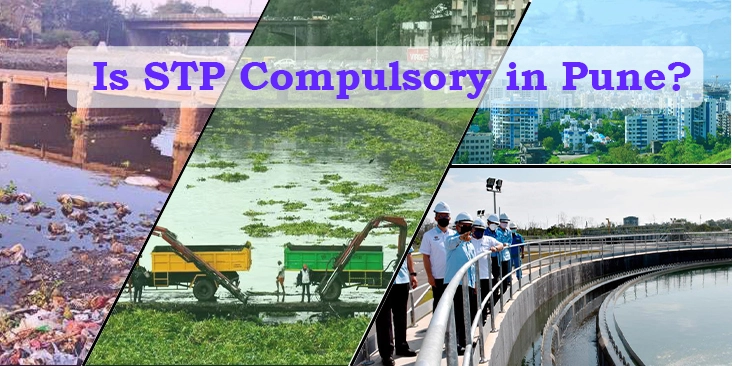Is STP compulsory in Pune?
Maintaining a clean and sustainable environment depends on the sewage treatment process. The Sewage Treatment Plant (STP) is one of the most important procedures in sewage management. In order to make wastewater suitable for reuse or disposal, STPs are made to treat it and eliminate any impurities.
Pune and other developing cities face serious challenges with sewage control. In order to maintain environmental sustainability and public health, efficient sewage management techniques are essential given the growing urban population and mounting strain on the sewage infrastructure. The sewage treatment plant (STP) is one of the most important parts of the infrastructure for sewage management. But the issue remains: Is STP compulsory in Pune? We shall examine the response to this query and its ramifications for Pune’s sewage management in this blog.
In metropolitan areas like Pune, wastewater management has emerged as a crucial issue that cannot be disregarded. Maintaining the city’s cleanliness and hygienic conditions for residents depends on effective sewage management.
Understanding the Mandatory Requirement: Is STP compulsory in Pune?
Residents, businesses, industries, and other establishments in Pune frequently dispose of the garbage they produce into rivers and other water sources without treating it. This has resulted in serious environmental damage and a health risk to the public, spreading water-borne illnesses and endangering lives. Is STP compulsory in Pune? The Pune Municipal Corporation (PMC) has started an initiative to construct and maintain sewage treatment plants throughout the city in an effort to help address this problem. The initiative’s goal is to create long-lasting sewage treatment facilities to raise city residents’ standard of living in general.
However, the adoption of these STPs has not happened quickly. STP is now required for anyone building a home or commercial property, according to recent government regulations. Before receiving their completion certificate, builders must guarantee that the building is operational and connected to the STP.

STPs Law and Regulations in Pune
Is STP compulsory in Pune? The Pune Municipal Corporation (PMC) has indeed implemented laws regarding the city’s sewage management. Internal STPs must be installed in all newly constructed residential and commercial buildings, per PMC regulations. Before getting completion certificates for their projects, builders and developers need to make sure that STPs are operating correctly. By requiring wastewater treatment systems in new construction, this rule lessens the strain on centralised treatment plants and stops untreated sewage from being released into the environment.
Pune’s STP laws are designed to encourage environmentally friendly methods of managing sewage. The PMC is strengthening the city’s overall sewage management infrastructure by requiring STPs for new developments. To satisfy increasing expectations, it is crucial to make sure that these laws are properly implemented and that the current infrastructure is updated.
Is STP compulsory in Pune?
Yes, STP is compulsory in Pune.
Challenges in sewage management:
Is STP compulsory in Pune? considering the city’s numerous challenges in this area, necessitating efficient sewage control techniques? Rapid population growth frequently causes blockages and effluent overflow, despite the presence of existing sewage infrastructure. These densely populated regions generate substantial wastewater, commonly discharged untreated into nearby water bodies, posing threats to human health and the environment. Increasing urbanisation, improper land use, and inadequate maintenance further intensify the problem.
Is STP compulsory in Pune? What are the penalties for non-compliance?
Pune residents who violate the STP laws risk facing harsh penalties. These sanctions might include monetary fines, permit suspension or revocation, and legal action taken against offenders. The seriousness of the infractions and the type of non-compliance determine how much of a penalty is imposed.
This will depend on the capacity of the STPs. As to the officials, STPs with a capacity of less than 300 kiloliters per day (KLD) will be fined Rs 2,500; those with a capacity between 300 and 500 KLD will be penalised up to Rs 4,000; and those with a capacity beyond 500 KLD will be fined Rs 5,000.
In conclusion,
Is STP compulsory in Pune? So, every new residential and commercial building in Pune is required to comply with STP, and non-compliance carries harsh fines. To update and strengthen the current sewage system and satisfy the city’s expanding needs, more substantial efforts are needed. A comprehensive strategy is needed to address the problems with sewage management, one that includes infrastructure investment, regulation enforcement, and public awareness-raising. Pune residents can benefit from cleaner and healthier surroundings thanks to efficient sewage control techniques. A step in the right direction towards accomplishing this goal is the Pune Municipal Corporation’s (PMC) initiative to require STPs in all new developments.
Overcoming these obstacles and eventually making Pune a sustainable and livable city will require maintaining the sewage infrastructure and firmly enforcing the laws. What do you think? Is STP compulsory in Pune? Comment below.

